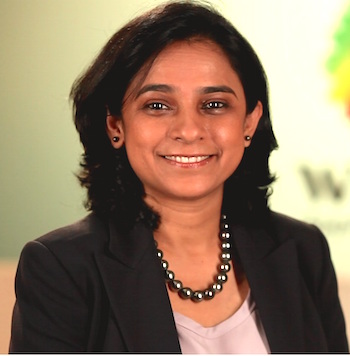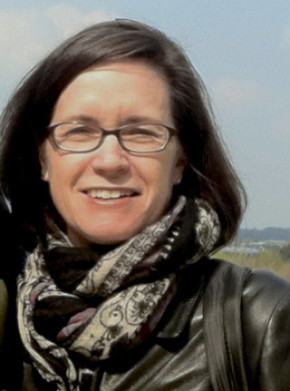I recall when I founded HfS Research nearly six years’ ago, one of the first people to visit our offices was the calm, but tenacious Sangita Singh – one of the most recognizable and popular faces of Wipro over the last decade.
Since then, Sangita has made a regular habit of visiting us at HfS during her analyst rounds in the Massachusetts area – a location right at the heart of many of her life sciences and healthcare clients. And what amazes me about Sangita is the fact she manages to (somehow) live simultaneously in both Manhattan and Bangalore at the same time, in the midst of all this merger-mania in healthcare.
While Wipro has built a reputation for helping to drive cost savings and provide IT and business process support and capability, Sangita is on a mission to take her firm’s healthcare solutions to the next level, by working with clients and partners to build connections between the many silos in today’s US healthcare system. At the heart of it is how to better serve the patients with the right combination of services and technologies in a more simplified and accessible way. It requires a different way of working both within Wipro, and with clients. It’s a big, bold dream, but that’s what gets her excited.
So when we convinced Barbra McGann to join us to lead our analyst coverage of healthcare and life sciences, I couldn’t resist introducing her to Sangita… and lo and behold the two of them cooked up a little interview for our reading pleasure…
Barbra McGann (Managing Director, Research at HfS): Sangita, your career has lately been a smorgasbord of specialized leadership roles, from an education in engineering, to most recently at Wipro as Chief Marketing Officer, then Head of Enterprise Application Services (EAS), and now, Chief Executive of Healthcare and Life Sciences. What is your approach to tackling each of these very different areas of expertise as a leader?
Sangita Singh (Chief Executive, Healthcare Life Sciences & Services at Wipro): Hi Barbra – it is to be open to listening and learning—from the team, from peers, from management, from the external environment, and to be inclusive. One thing that defines me is my curiosity—my willingness to not take myself too seriously and be willing to learn from anybody and everybody. That provides the input. Then I do three things: First, I carve out a really audacious big bold dream that can be called strategic vision, that I remain consumed by. Then I try to spend hours and hours getting my entire team inspired and on the same page with respect to that dream. Therefore, the second aspect is gathering, garnering and building a team that lives that dream and I think is better than me to be able to execute on that dream. Thirdly, I focus on execution or whatever we have committed to make it happen for my customers, and for my people as well, within Wipro.
Barbra: It sounds like you’ve created an ideal triangle—vision, team, and energy for execution—to apply to healthcare, where there is such an opportunity for change. In general, people have a poor view of healthcare, often describing it with terms like “confusing,” “red tape,” and “expensive.” What’s your vision for the future of healthcare?
Sangita: Fundamentally, Barbra, healthcare is about enriching people’s lives. Clearly, the industry is going through a huge disruption and a lot of transformation in the way healthcare will be delivered, the way it is accessed and how affordable it can be. There are three mega trends that we think are shaping the direction. One is clearly patient empowerment, which includes how patients access and use information through digital technologies. The second is the pay for performance revolution that we are seeing in accountable care organizations, and with population health management to drive the accessibility, affordability, and quality of care. Finally, the third important piece is digitalization, the rapid adoption of which will allow a patient-centric platform to give new access to customers through mobile, cloud, and 3D printing.
Barbra: Technology can be a great enabler, as you know, Sangita. How do you seeing it playing a more effective role in changing the way healthcare is perceived to be more about enriching people’s lives?
Sangita: 32 million new people are coming under the coverage driven by Obamacare. A lot of that is Medicare. In Medicare we have a Software as a Service platform that allows access to people, that allows eligibility, enrollment, and revenue reconciliation to be done through that one platform. Secondly, we are able to build analytics to drive population health management through patient engagement. Finally, in the Medicaid space, we are working with modern platforms that can drive all the business objectives that are relevant for the new Medicaid priorities such as dual eligible. Therefore, we are helping our customers in two ways. One is around changing their business models—how do I digitalize them better? And the other one is as far as the run is concerned—how do I drive automation and application and infrastructure support to run organizations more efficiently?
Barbra: How would you sum up your vision for the role of Wipro as a business process outsourcing services provider in the emerging As-a-Service Economy?
Sangita: Our vision is to build a patient-centric interconnected health ecosystem through solutions and platforms at the intersection of payers, providers, life sciences, and medical devices. I think the big role that we can play is to be able to create the interconnections in the healthcare ecosystem. This used to be fairly siloed. So medical devices would operate in isolation with the patients or largely with the providers. But today with the patient at the center of everything there is a need for the data to get connected, there is a need for interactions to get connected, there is a need for engagements to get connected. We can provide systems, services, and IT that can enable this. To build a very patient-centric interconnected health ecosystem is really our big dream.
Barbra: Sangita, this is some significant change we are talking about with interconnections and digitalization. It’s going to take another many-syllable word: re-imagination—stepping outside of what is it that we are doing day to day, reminding ourselves that this is really all about the patient and considering how create the right process to get them to the health and care they need at the time they need it in way that they can afford to pay for it, or get help to pay for it.
Sangita: And the word that you used, the reimagining, is the most powerful part. Across every process thanks to digital technology at the front and automation at the backend, really every process that touches the patient can be reimagined. And that’s really in essence the huge opportunity that lies before us.
If you see the number of startups that are there that are leveraging cloud in the form of digital technologies and disruptive traditional business models, it’s just astounding. I was just reading about a startup (Theranos) started by Elizabeth Holmes, which could disrupt the diagnostics business, using a drop instead of a vial of blood for tests and taking lab reports on line. So cloud and digital is reality.
I think is very exciting for new age providers like ourselves because of the opportunities it provides and therefore levels the playing field for all. Because it’s new it would be the same for IBM, it would be the same for Accenture and the same for us. So that’s what’s exciting. I think cloud is the best disruption to have happened for any new age service provider.
Barbra: Earlier, you mentioned analytics. Will you tell us a little bit about how Opera plays a role in analytics for Wipro and its clients? It was a big announcement and a very strategic move for Wipro to invest in Opera. How this is playing out in the healthcare industry? What role do they take in helping to realize the vision?
Sangita: Opera has been an interesting partnership. What Opera was known for was building algorithms used in the payer and provider space: in the provider space for revenue leakage, utilization of hospitals, and in the payer space for fraud and abuse detection. They had a number of use cases for payer and provider. Now we are working with them to build use cases for life sciences, largely in the R&D and clinical trial space.
We have also used Opera on the backend for all the service desks supporting business process outsourcing. We leveraged Opera to drive analytics that can help us drive better user experience and a quantum jump in productivity.
Barbra: It sounds like there’s quite a bit going on with clients directly, as well as internally, on Wipro’s own processes and activities around outsourcing services.
Sangita: They have data scientists who can build algorithms that can detect patterns, remove false positives, so on and so forth… really almost any business problem. The constraint that we have if any, Barbra, is Wipro having access to customers where they call us in assuming that we can help them with their business problem. Our brand is more synonymous with cost takeout. And so that’s a big constraint. But once we have worked with a customer and have gained their trust and confidence, then we move forward and proactively propose value added propositions like what we can do with Opera – this is how we define success.
Barbra: Certainly a key change we have seen as the sourcing industry has matured, Sangita, is that partnerships between service buyers and providers bring more long term value to both parties where trust has been established. You have said that personal interaction and networking is incredibly critical. What would you recommend being effective this way in networking?
Sangita: It’s important to learn from anybody and everybody, Barbra. Thanks to the digital world we are no longer as siloed as we were before when you could network only by meeting people physically. Now all of that has been disrupted and you can meet anyone, anytime virtually. In addition, you know there is so much access and information that you can have about who to connect with and how to connect through social media.
Each one of us is unique and we hear and have read this a dozen times but yet we do so little about it. Each one of us is passionate about something, and we have the opportunity to be a thought leader in that area. And I think one should always go out there and network and be known for something. I am still not there 100 percent but it is definitely in one my strategic to dos. And I am learning hard from the millennials on how to get really active and relevant and sort of cool in the digital world as well.
Barbra: You have inspired me to do that, too, Sangita! Thank you so much for sharing your passion for patient centricity and Wipro’s role in helping healthcare and life sciences companies achieve it. We will be watching for more of it online @sangitasingh101 and @wiprohealthcare.
Posted in : Business Process Outsourcing (BPO), Cloud Computing, HfSResearch.com Homepage, IT Outsourcing / IT Services, Outsourcing Heros, smac-and-big-data, The As-a-Service Economy









This is a great interiew and loved reading it!